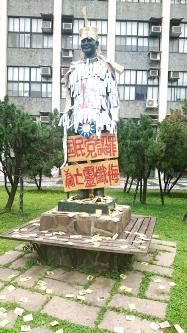With the 68th anniversary of the 228 Incident approaching, President Ma Ying-jeou’s (馬英九) administration has come under fire from Academia Sinica modern history researcher Chen Yi-shen (陳儀深), who said the administration is misrepresenting history and mitigating the Chinese Nationalist Party’s (KMT) responsibility for the 228 Incident.
The very nature of the 228 Incident, a historical tragedy that is the by-product of a clash of different ethnicities, is that it was a massacre of civilians by the KMT government, Chen said.
The 228 Incident refers to an uprising that began on Feb. 27, 1947, against the then-KMT authoritarian regime and the resulting brutal crackdown that left tens of thousands dead and led to nearly four decades of martial law.
The KMT government under then-Taiwan governor Chen Yi (陳儀) pursued a policy of demilitarizing local villages and arresting alleged criminals based on a list provided by villagers informing on each other, Chen Yi-shen said.
Many innocent people were implicated, and even some of the civilians who were on the committee handling the issue were later arrested, Chen Yi-shen said.
There was an element of using the Incident as a way to exact personal revenge, and the 228 Incident was in essence a vindictive slaughter by the KMT government, Chen Yi-shen said.
When Ma — in his capacity then as KMT chairperson — defined the event on the party’s Central Standing Committee meeting in 2006 as one in which the government had forced citizens into revolt and that it was not caused by ethnic differences, it was controversial and met with protests from many of the Incident’s victims, Chen Yi-shen said.
Ma’s comments represented a conscious effort to depart from the traditional KMT definition of the Incident, which was that it was a revolt sparked by communists, and that the military intervention was necessary to maintain the stability of Taiwanese society, Chen Yi-shen said.
The 228 Incident occurred as the KMT government was embroiled in its second civil war with the Chinese Communist Party.
However, Ma’s views on the Incident were subjective and could be said to distort the history of the Incident, as Ma is overlooking the evident ethnic conflicts in the incident, Chen Yi-shen said.
The 228 Incident stemmed from the KMT government officials, commonly called waishengren (外省人) to distinguish them from native Taiwanese, being unable to understand the local ethnic groups, as well as from the rampant corruption of KMT officials, Chen Yi-shen said.
That the government forced the civilians to revolt was only part of the Incident, Chen Yi-shen said.
Many innocent waishengren were also embroiled in the Incident, which causes many of the families of the Incident’s victims to find the Ma administration’s definition unacceptable, Chen Yi-shen said.
Source: Taipei Times - 2015/02/27





















